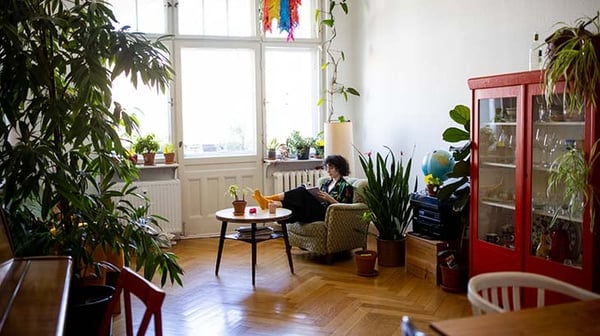How much should I put into my pension?
Get the lowdown on how much to pay in and when you’ll start paying it
It can be hard to know where to begin when it comes to thinking about your pension contributions. We’ve found that many people like you ask:
- When I start out, how much should I be paying into my pension?
- How much do other people pay into their pensions – and does that change as they age?
- If I’m getting closer to retirement and haven’t saved much, have I run out of time?
We’ve put together this article to help you with some answers.

How much should I put into my pension?
It's a difficult question to answer. How much you should pay into a pension depends on a lot of different factors, from what sort of lifestyle you’d prefer in retirement to how much you can afford to save just now.
Start by thinking about what your ideal retirement might look like and how much it could cost. For a little help, visit the Retirement Living Standards website. It’ll help you rough out how much income you might need.
Then you’ll need to think about how long you’ll need it for.
What sort of age do you want to retire at?
- Some people save hard to retire early. That's usually 55 or 57 - sometimes sooner.
- Most of us have to keep going to pay the bills and keep a roof over our heads. A few are lucky enough to love what they do and keep going for as long as possible.
- And how long do you think your retirement will last? Hopefully for as long as possible – but if you’re hoping for a few decades of luxury trips, you’ll need to put a fair amount away to pay for them.
And whatever other choices you make, you’ll hopefully end up with regular State Pension payments. At the moment:
- The most you can get is £11,973 a year.
- To get that, you’ll need to have paid National Insurance for the full 35 years.
- If you retire in the tax year 2025/26 you need to be 66 to claim it, but that will go up to 68 over the next few years.
How much should I contribute to my pension by age?
The ideal pension contribution level doesn’t just depend on your age. It’s also a question of how much money you’re making, how much you can afford to save, what sort of retirement you’re aiming for and lots of other factors.
But there’s one tip that might be helpful.
- Many people work out how much they should be investing by halving their age. That gives you a rough idea of what percentage of your salary should go to your pension.
- For example if you’re 30, set things up so your pension contributions (including any money from your employer) equal 15% of your salary.
- Remember that that’s just a suggested amount. It might not be a realistic possibility for you – especially as you get older and the amount to save climbs to 25% or more of your salary. And it doesn't guarantee your dream pot size when you do decide to retire.
There are also three important general principles to bear in mind.
- The sooner you start investing in it, the better. That gives your money more time to grow and ride out any stock market ups and downs.
- You might be able to invest more by cutting down your spending elsewhere. Map out your monthly budget and see if there’s anything you can strip out of it.
- If you get a pay rise or bonus, think about putting some or all of the extra money straight into your pension so you don’t get too used to having it around.
What is the average pension contribution in the UK?
Across the UK, around 22.6 million people were paying into their workplace pensions in 2021. Many of those people will have had help from their employers, who will have contributed at least 3% and the rest coming from the employee, bringing the total to 8%. The exact amount you want to contribute is entirely up to you, though of course it could affect how much your employer adds in too.
How much will my pension be worth?
The value of your pension pot isn’t guaranteed and can be hard to predict, especially if you’re a long way from retirement. And in this context, value can describe two different things:
- The amount you have saved in your pot when you retire.
- The income your pot can give you once you’ve retired.
One thing’s always true though: the sooner you start making regular payments into your pot, the more time:
- You have to build up your pot.
- Your investments have to grow (though of course their value can also shrink).
Working out how much you might have in your pot when you retire
That depends on how much money goes into it, what sort of investments you choose to make and how well (or not) they do over the years.
Here’s an example of how that could work out. We’ve worked out how much you’d end up with if you and your employer paid a monthly total of £150 into your pension, including tax relief. We’ve based our calculations on a default fund and assumed a growth rate of 2.9% a year. This growth has taken into account an inflation rate of 2% and annual charges of an Annual Management Charge (AMC) of 0.37% and Fund Management Charge (FMC) of 0.13%. Your charges might be higher or lower than these.
| If you start your plan on your: | Once you’re 67, you’ll have: |
| 25th birthday | £94,800 |
| 35th birthday | £66,800 |
| 45th birthday | £43,100 |
| 55th birthday | £22,400 |
To find out your own pension’s growth rate, log into your online account or check your pension statement. It could also be worth making sure that you’re happy with the funds you’ve chosen.
And remember, this is just an example based on some specific assumptions. Those assumptions won’t apply to your pension. Growth rates will vary and you might have put your money in different kinds of fund.
There’s also no guarantee that your investments will grow. As with any investment, their value might go down. You could even get back less than you paid in.
Working out how much income your pension pot can give you
When you reach 67, you’ll probably be able to take up to 25% of your pension pot as a tax-free lump sum. So let’s start by assuming you do that. Based on our pension estimates above:
| If you started your plan on your: | Your tax-free lump sum will be: |
| 25th birthday | £23,700 |
| 35th birthday | £16,700 |
| 45th birthday | £10,700 |
| 55th birthday | £5,610 |
Then you need to decide what you’re going to do with the rest of your pot. If you’re looking for financial stability, an annuity could be a good choice. Buying one will give you a guaranteed income for life. Though do make sure you choose the right one - you can’t change it once you’ve taken it out.
Based on the same assumptions as above, once you’ve taken your tax-free lump sum:
| If you started your plan on your: | You could buy an annuity that gives you: |
| 25th birthday | £4,790 a year |
| 35th birthday | £3,450 a year |
| 45th birthday | £2,270 a year |
| 55th birthday | £1,200 a year |
Figures correct as at April 2025.
When we worked those figures out, we assumed that:
- You’re buying a single annuity that pays the same amount every month for the rest of your life, and for no less than five years.
- You haven't chosen to switch your payments to a loved one after your death.
Because your payments won’t rise with inflation, in real terms their value could go down over the years.
If you’re thinking about buying an annuity now, it’s important to shop around to find the right product for you. Another option is drawdown. Putting your pension pot into drawdown means you leave your money invested for you to take out as and when you need it. The money left invested could grow to replace some or all of the money you drawdown, though its value could also drop. You can also run out of money, so unlike an annuity your payments aren’t guaranteed. There are other options available to think about when it comes to accessing your pension savings, so before you make a decision you should make an appointment with Pension Wise, a free government guidance service from MoneyHelper.
And remember, these calculations don’t include your State Pension. You might also have other sources of income to factor in. Adding them all together will give you a sense of how much your retirement income could end up being.
FAQs
The best amount to invest depends on your circumstances just now and the kind of retirement you’re aiming for. If you’re not sure how much to save, visit the Retirement Living Standards website.
No! It’s best not to wait until you’re 40 to start saving, but if you’ve reached 40 with either no or a small pension there’s still plenty of time to save more. If you plan to retire when your State Pension kicks in, you could have 25+ years of retirement saving time ahead of you.
Working out your ideal retirement income will help you see what your pension pot size should be at 40. For example, the Retirement Living Standard's say that for a moderate standard of living you’d need £31,700 a year. If you qualify for the full new State Pension, in 2025/26 that's £11,973 a year, so you’ll need to be on track to have enough to create an extra retirement income of about £19,727 a year when you retire.
Some people think that by 30 years old, you should have one year of your annual salary invested in your pension pot. So for example, if you’re 30, earn £25,000 a year and have a pot worth £25,000, you’re on track. But really, there’s no right or wrong answer. It’s good to have some money saved, but the ideal amount depends on your pay, circumstances and long term retirement goals.
Related articles

What tax will I pay on my pension pot?

Can I opt out of my pension?
